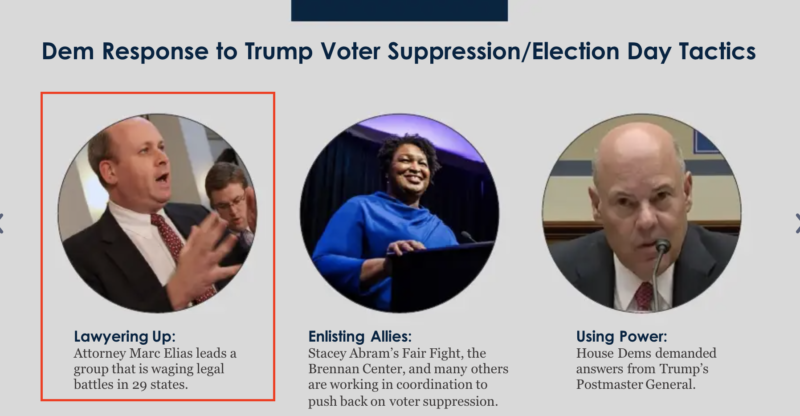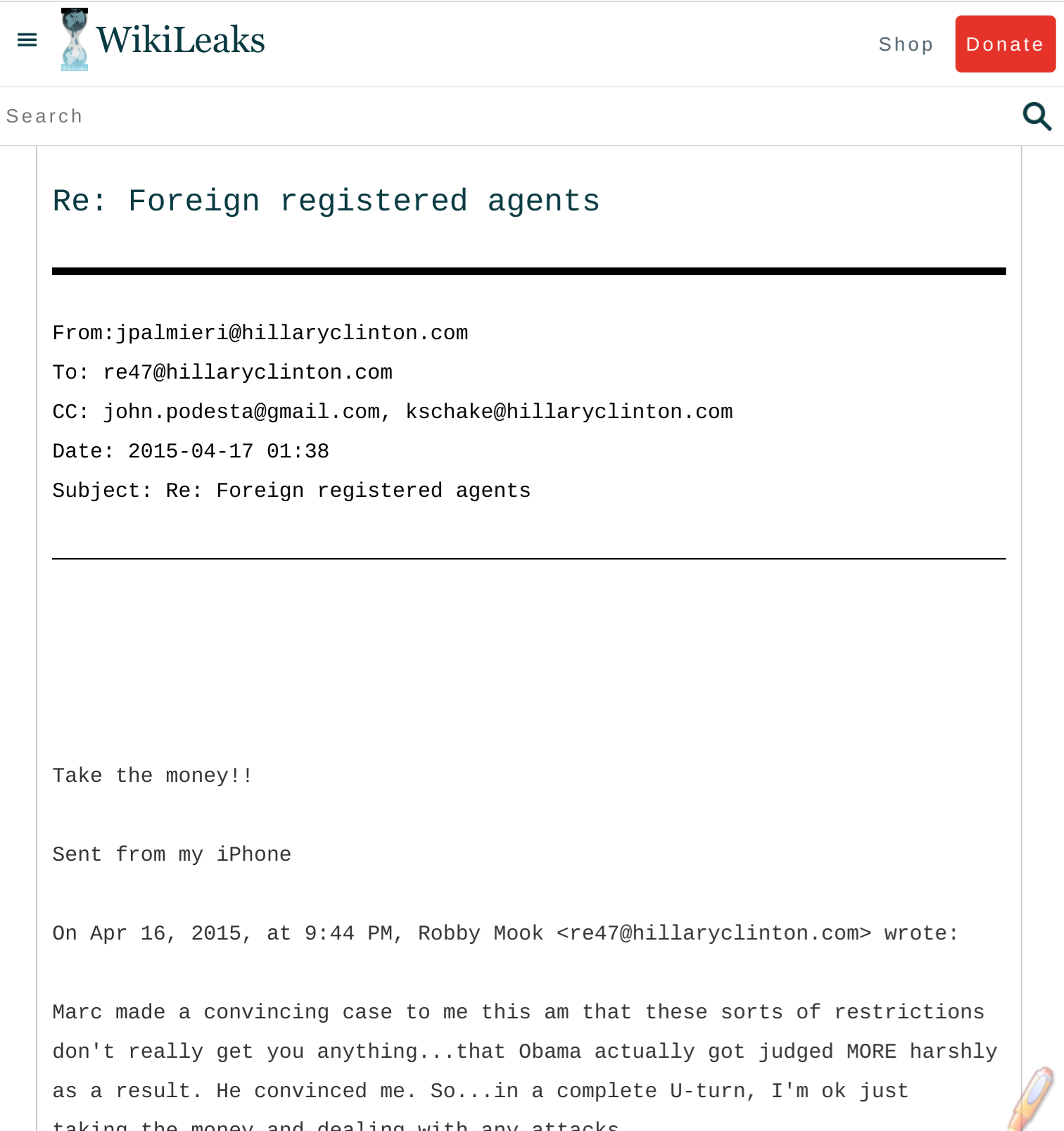The founder of a Democrat-led group known as Democracy Docket, the “leading platform for progressive advocacy and information about voting rights and elections,” encouraged Hillary Clinton’s 2016 campaign to take money from foreign entities.
The individual in question, Marc Elias, is currently engaged in 28 lawsuits across 15 states aimed at combatting President Trump’s alleged attempts at voter suppression. In reality, however, his organization appears to function as part of Democrat’s broader network aimed at securing a victory for Democratic Presidential candidate Joe Biden by interfering with the electoral process.
For example, Third Way, a D.C.-based think tank that features prominent Biden supporters such as Senators Chris Coons and Joe Manchin as co-chairs, touted Elias as an integral component of the “Democrats’ response to Trump voter suppression/election day tactics.”
In the group’s presentation, which peddled Transition Integrity Project-conceived narratives that President Trump will refuse to concede the upcoming election, described Elias as constituting the Democratic party’s efforts to “lawyer up” by “lead[ing] a group that is waging legal battles in 29 states”:

Democracy Docket has also garnered national media attention, with the Wall Street Journal describing it as the “legal muscle” for Democrat’s election-centered lawsuits and The New Republic characterized Elias as “the man who is determined to stop Trump from rigging the election.” New York Magazine also perpetuated Elias’s fearmongering over the election with a nearly 1,400 -word puff piece, detailing the extensive resources he wields:
“Elias, 51, leads a sprawling team of attorneys who, together with official Democratic Party committees, super-PACs, and progressive organizations, have been appearing remotely in court hearings around the country, and their litigation list keeps growing.”
Despite this laudatory coverage, all outlets have ignored a clear way in which Elias has undermined the integrity of elections: pushing the Hillary Clinton campaign in 2016 to take foreign money while acting as the candidate’s lawyer.
Elias was identified by Clinton’s 2016 campaign director as “convincing” the campaign they should take money from registered foreign agents – Americans who lobby on behalf of foreign countries, individuals, and businesses. Elias opposed a “bright-line rule” against universally opposing this source of cash, perhaps foreign.

In the email thread between high-level staffers of the Clinton campaign, participants attempted to make a decision on “allowing those lobbying on behalf of foreign governments to raise $ for the campaign,” as outlined by National Finance Director Dennis Cheng.
Failing to shun foreign lobbyists’ money entirely, Elias initially responded 19 minutes after Cheng’s April 13th email proposing the campaign vet prospective donors “case by case”:
“This is really a straight up political call. One middle option is to take case by case. If, for example, they are FARA registered for Canada, we may not case. If for N. Korea we would. But really comm’s call.”
A phone call between Campaign Manager Robby Mook, Campaign Chairman John Podesta, Research Director Tony Carrk, and Campaign Vice-Chair Huma Abedin led to the decision the campaign would “not allow any currently registered foreign agents (those who register with FARA) to contribute or raise for the campaign. If someone terminates their registration, they would be allowed to contribute or raise for the campaign.”
In that same email, the staffer inquires: “Marc, we’d especially like your perspective on adopting this policy.”
Elias responded the following day, emphasizing he “lean[ed] away from a bright-line rule.”
Continuing on, he made the case for allowing registered foreign agents to be able to raise money for the campaign, despite their conflicts of interest:
“It seems odd to say that someone who represents Alberta, Canada can’t give, but a lobbyist for Phillip Morris can. Just as we vet lobbyists case by case, I would do the same with FARA. While this may lead to a large number of FARA registrants being denied, it would not be a flat our ban. A total ban feels arbitrary and will engender the same eye-rolling and ill will that it did for Obama.”
After Mook inquired where the campaign would “draw the line,” Elias responded:
“If we do it case by case, then it will be subjective. We would look at who the donor is and what foreign entity they are registered for. In judging whether to take the money, we would consider the relationship between that country and the United States, its relationship to the State Department during Hillary’s time as Secretary, and its relationship, if any, to the Foundation. In judging the individual, we would look at their history of support for political candidates generally and Hillary’s past campaigns specifically. Put simply, we would use the same criteria we use for lobbyists, except with a somewhat more stringent screen. As a legal matter, I am not saying we have to do this – we can decide to simply ban foreign registrants entirely. I’m just offering this up as a middle ground.”
Hours later, Mook identified Elias as the chief catalyst in his decision for allowing the campaign to “take the money.” As the campaign director wrote:
“Marc made a convincing case to me this am that these sorts of restrictions don’t really get you anything…that Obama actually got judged MORE harshly as a result. He convinced me. So…in a complete U-turn, I’m ok just taking the money and dealing with any attacks.”
Director of Communications Jennifer Palmieri promptly followed up with a brazen “Take the money!!”


